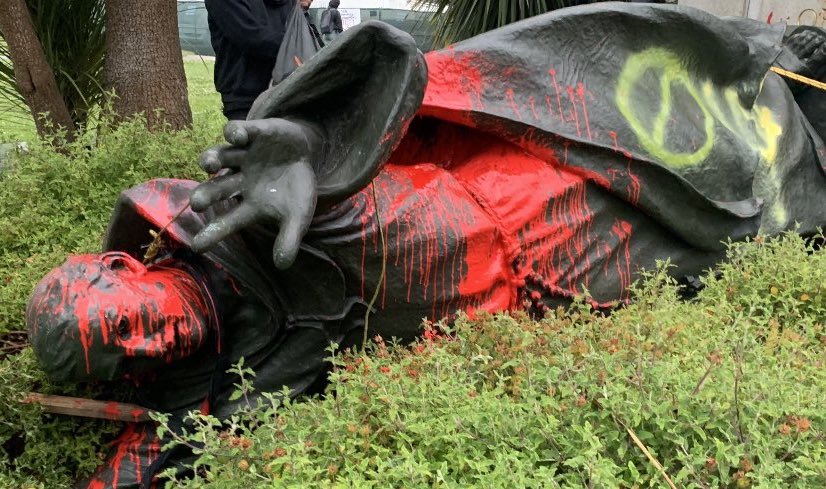The latest casualty of the wave of iconoclasm that is sweeping the US has been the statue of the Franciscan mission priest Junipero Serra in Golden Gate Park, San Francisco. Serra, who was recognised as a saint by the Catholic Church in 2015, has been called the Apostle of California for his evangelistic work there in the eighteenth century, when the area was still under the control of Spain.
Serra seems to have been an incredibly driven and hard-working individual, with a reputation as a scholar and ascetic. He established numerous missions across what is now Mexico and the United States, despite suffering chronic health problems. Altogether he spent more than thirty years spreading the Catholic faith in the Americas, a calling for which he had abandoned a promising career in the Spanish church. His canonisation ceremony, presided over by Pope Francis during his visit to the USA in 2015, featured Catholics from Native American backgrounds.
The controversy over the honour paid to Serra seems to arise from both particular and general concerns about his work. Critics highlight the apparent frequent use of corporal punishment and physical restraint of native Californians who worked at the Catholic missions overseen by him. More widely, Serra and others like him are seen as complicit in the injustices and violence of Spanish colonialism. Although Serra himself often clashed with the military authorities over their brutality towards the indigenous population, and urged clemency when some of them burnt down a mission, it is understandable that the Catholic missions are still viewed with a certain ambiguity by some present-day Native Americans. The effect of European settlement on their way of life and their culture was catastrophic.
But the question remains how much of the antagonism to Serra and others like him is sincere and well-founded, and how much of it is part of a simplistic campaign of vilification of those wicked Dead White Men who represent the old Western civilisation so hated by modern first world progressives.
Nevertheless, it can be uncomfortable for modern-day Christians to reflect on the extent to which the spread of the faith in certain places was not only accompanied, but arguably enabled, by especially rapacious and cruel forms of imperial expansion. As a Christian, I find it hard to regret the fact that Christianity has reached almost every corner of the Earth, but we ought to be honest in how we reflect on some of the means by which this has been achieved.











Join the discussion
Join like minded readers that support our journalism by becoming a paid subscriber
To join the discussion in the comments, become a paid subscriber.
Join like minded readers that support our journalism, read unlimited articles and enjoy other subscriber-only benefits.
Subscribe